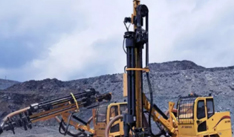How Hydraulic Drilling Rigs Boost Productivity
Hydraulic drilling rigs can significantly boost productivity in various industries, including construction, mining, geotechnical engineering, and oil exploration. Here's how these rigs contribute to increased productivity:
Faster Drilling Speed:
Hydraulic drilling rigs are known for their ability to drill quickly and efficiently. The hydraulic system provides high torque and precise control, allowing for faster drilling rates compared to mechanical or pneumatic rigs.
Versatility:
Hydraulic rigs are versatile and can be adapted for a wide range of drilling applications. They can handle various drilling methods, such as rotary drilling, core drilling, and auger drilling, making them suitable for different projects and geologies.
Reduced Downtime:
Hydraulic systems are known for their reliability and durability. They have fewer moving parts than mechanical systems, which means less wear and tear, fewer breakdowns, and reduced downtime for maintenance and repairs.
Increased Depth and Reach:
Hydraulic drilling rigs are capable of drilling deeper and reaching greater depths compared to many other types of rigs. This extended reach is particularly advantageous in mining and oil exploration, where access to deeper resources is essential.
Precise Control:
Hydraulic systems offer precise control over drilling parameters, including speed, depth, and pressure. This precision ensures that drilling is carried out accurately, reducing the need for corrections and rework.
Ease of Operation:
Hydraulic drilling rigs are designed to be user-friendly, with intuitive controls and interfaces. This ease of operation reduces the learning curve for operators, allowing them to work efficiently and effectively.
Remote Operation:
Some hydraulic rigs can be operated remotely, enabling operators to control the rig from a safe distance. This is particularly useful in hazardous or inaccessible areas, improving both safety and productivity.
Adaptability to Challenging Terrain:
Hydraulic drilling rigs can operate in rugged and challenging terrains, including uneven ground and rocky surfaces. Their adaptability to adverse conditions ensures that work can continue in various environments.
Minimal Environmental Impact:
Hydraulic drilling rigs are often engineered to minimize their environmental footprint. This reduces the need for extensive environmental mitigation measures, streamlining the drilling process and increasing productivity.
High Efficiency in Sample Collection:
In geotechnical and core drilling applications, hydraulic rigs can efficiently collect samples for analysis. This is crucial for geological studies and construction projects, saving time and resources.
Customization Options:
Hydraulic drilling rigs can be customized to meet the specific needs of a project. This adaptability allows for greater efficiency and productivity when dealing with unique drilling challenges.
Cost-Effective Operation:
Although the initial investment in hydraulic drilling rigs can be significant, their efficiency and durability often result in lower overall operating costs over the long term.
In summary, hydraulic dth drilling rigs are favored in many industries for their ability to drill quickly, accurately, and efficiently. Their versatility, precision control, reliability, and adaptability to various conditions contribute to increased productivity, making them valuable assets for projects that require drilling operations.

评论
发表评论